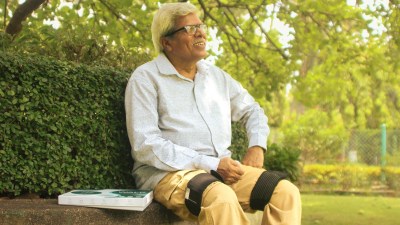The digital imagination
Something unusual happened to books this month. They no longer need to come out in hardback or paperback, nor in paper and ink. June 1998 ha...

Something unusual happened to books this month. They no longer need to come out in hardback or paperback, nor in paper and ink. June 1998 has seen the complete birth of the digital text.
Of course, the electronic book has been around for almost a decade, but it has always been copyright-expired material. A typical electronic library on the Internet would stock copies of Lord Jim, The Frogs, Anabasis and The Book of Mormon, scanned straight off a dog-eared print copy and uploaded into cyberspace. It was strictly a cottage industry.
But this month, electronic publishing came into the mainstream. An entry for this September8217;s Booker Prize by British author Patricia Le Roy marks a complete break with tradition 8212; it is to be found only on an Internet Website. Angels of Russia, a novel set in the glasnost and perestroika years, has not gone into print anywhere in the world.
Having accepted Le Roy8217;s work and ensured online writing an entry into the literary establishment, the peoplebehind the Booker are now philosophising about the need to upgrade the definitions of various terms that have suffered no change since Gutenberg 8212; book, jacket, print, page, spine. Publishing, ever a conservative industry, is having to come to terms with the defining deficiency disease of the digital age 8212; the constant, unrelenting need to upgrade.
Does a digital text have a spine somewhere? Is it possible to turn8217; its pages8217;? Is it possible to curl up with a good electronic book? For that matter, is it possible for it to come out in a calf-bound edition? With due mock-seriousness, the industry is even debating such fringe issues.
There are serious-serious issues at hand, of course, because it is entirely possible for digital publishing to change the face of the industry. Over the last century, it has gotten used to going by the book. The first chapters of a literary work are written in obscurity. They are picked up by a literary agent who brings them to the attention of his favoured publishers. Someof the obscurity is thereby dispelled. A publisher chooses to make an advance.
The writer is even less obscure now: he actually has a profession. Then the work comes out in a limited hardback edition, which is reviewed and thereby authenticated in the Times Literary Supplement. All parties having been satisfied, the book finally makes it to the mass market in paperback form, publication rights are distributed for various territories across the world and the writer gets a royalty.
These repeated validations are very necessary in publishing, which is a notoriously chancy, high-investment business. Down the years, there has been only one notable departure 8212; Pan Books8217; decision to dispense with hardbacks and go straight into paperback, which started a worldwide trend.
But none of these validations would apply to an online work, except the TLS review TLS took dutiful note of Angels of Russia. They are vanities that have outlived their usefulness. Here, the literary agent iscut out of the picture altogether. Publisher investment is minimal. The advance is an unknown institution. The publishing format is, so far, almost irrelevant. There is no question of step-by-step, territory-by-territory marketing. A book on the Net sells globally, by definition.
While traditional criticism is taking note of online writing, it is doubtful if the latter has any use for the critical establishment. The Net prefers to do without the hierarchies of criticism, control, validation and rejection that the offline world has institutionalised. A buyer on the Net does not depend upon authorised opinion or advertising to make his choices.
Online Originals, the Website that has published Patricia Le Roy, was set up in reaction to mainstream publishing, which has become increasingly corporate over the years, and therefore increasingly unwilling to take risks. It tends to disfavour new writing, has enormous faith in celebrity names, and is an unlikely creative laboratory. Online Originals has gambled onthe premise that the next big idea is not to be expected in hardback. It will, more likely, be delivered to you by email.
The Booker8217;s capitulation is only the last, most visible step in a process that has been going on for almost two years. Something equally important preceded it last month. After two years spent trying to convince the authorities that an electronic text reader which looks like a physical book is a good idea, Everybook got a patent. It is a hardbound8217; unit the size of a novel that can be opened just like a book. Inside are two facing pages8217; 8211;liquid crystal screens, actually, that displaying text in the serif fonts that traditionally find favour in print.
Everybook, of course, is not really a book. Titles have to be bought separately stored on a microchip and inserted into the reader. Everybook is unlikely to be available calf-bound anytime soon, but an edition in a marbled jacket is definitely planned. It is an attempt to ensure a traditional reading experience in a digitalformat.
Exactly the opposite is being attempted by the new genre of hyperfiction, which seeks to hand over control of plot development, normally the preserve of the writer, to the reader. Each hyperfiction page has a number of links. The plot develops according to which links the reader chooses to follow. In other words, every time he begins at the beginning, the reader is told a new story.
Hyperfiction is so machine-based and so divorced from the familiar linear format of storytelling that publishers have been reluctant to venture into it. But now, the very respectable New York University Press has taken the plunge with a commitment to publish hyperfiction titles every year on its Web page. Probably, this is the way to the future, despite the current obsession with producing book-like8217; electronic texts. The children of today are as likely to read Alice in Wonderland for the first time on a computer as on paper. The readers of tomorrow, they will not really care what format their literature comespackaged in.
If you look at a book as pages between covers, it is in trouble. If you look at it as an intellectual artifact that is written, read, stocked, bought, sold, discussed, eulogised and torn apart, it8217;s leading a rich electronic life, for all these symptoms are visible on the Net. The book, which is regularly feared to be dying, is successfully mutating in order to survive.
- 01
- 02
- 03
- 04
- 05






























